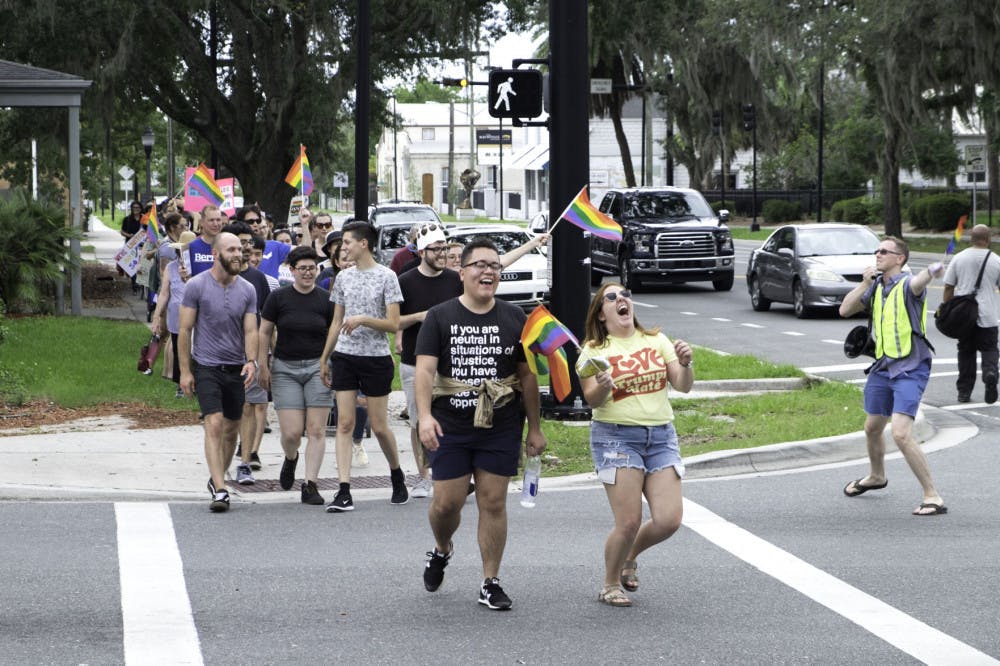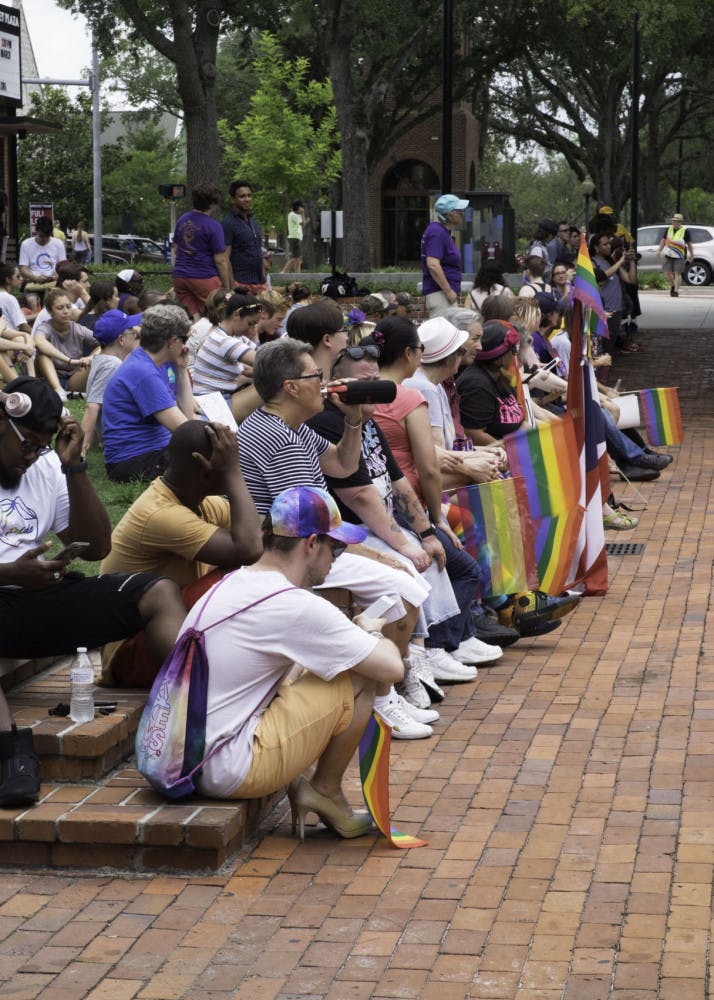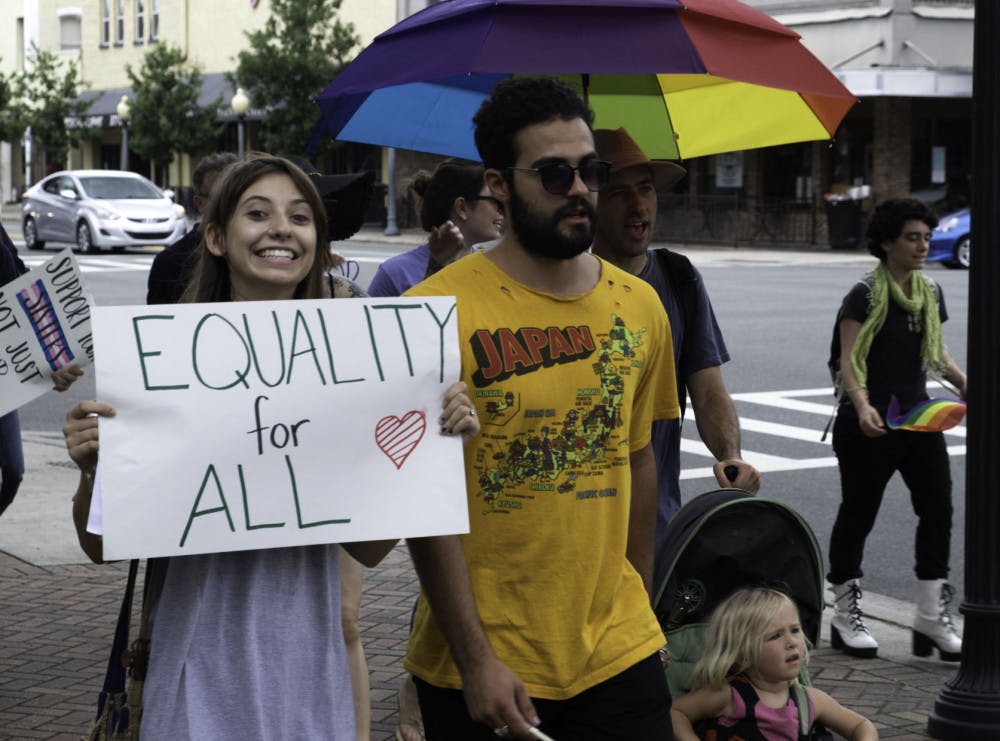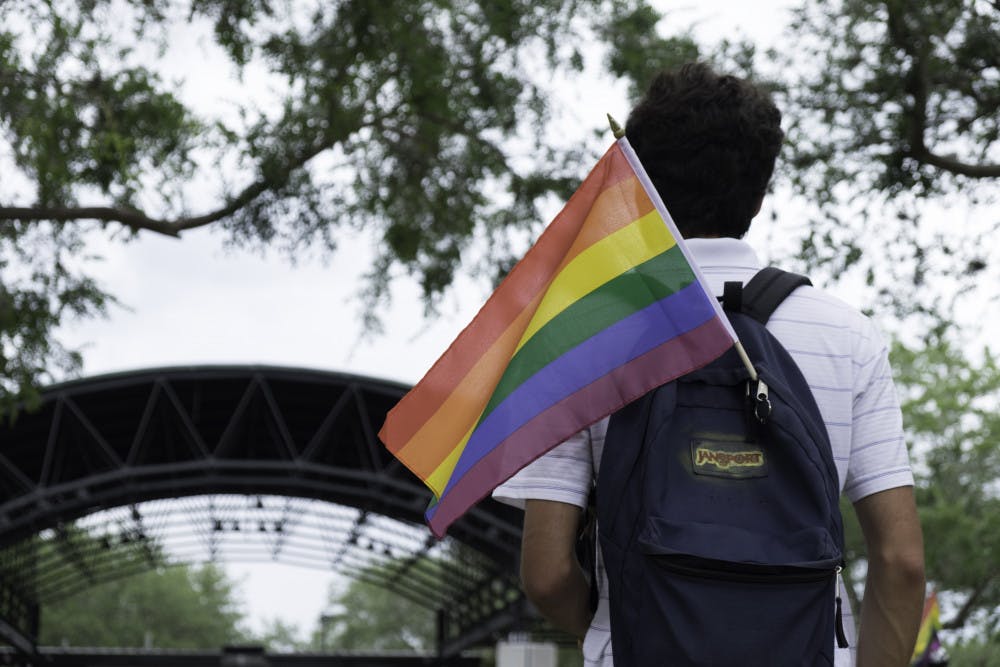For a brief moment Sunday afternoon, despite hundreds of people packed closely together in the Gainesville summer heat, the Bo Diddley Community Plaza was still.
The plaza served as a gathering place for those who spent their afternoon marching for LGBTQ+ rights, honoring the 49 lives lost just one year ago at a mass shooting inside of Pulse nightclub in Orlando.
One by one, the names and ages of each victim were read aloud from the stage.
Some bowed their heads, others fought back tears. All fell silent.
“May you rest in power,” organizer Diana Moreno said, honoring those who died.
Moreno told the crowd that Monday marks exactly one year since the tragedy, which was one of the deadliest mass shootings in U.S. history.
Before they gathered Sunday for a rally downtown, more than 400 community members demonstrated in the national Equality March for Unity and Pride in solidarity with tens of thousands across the country. The central march took place in Washington D.C. on Sunday, according to the Associated Press.

Rev. Catherine Dearlove, a pastor with the Trinity Metropolitan Community Church of Gainesville, said she felt a degree of urgency when helping to organize the march. As soon as she heard about the march in Washington D.C., Dearlove said she and about 11 other local organizers began coordinating the Gainesville-area event, which was hosted by the Pride Community Center of North Central Florida.
The voice of hate is growing in the U.S., Dearlove said.
“It’s really important for us to stand together in solidarity, especially with the date coinciding with Pulse,” the 53-year-old said.
Along the east edge of the plaza’s center, organizers prepared tables with poster displays to honor those in the LGBTQ+ community who have died.
Photos of every life lost at Pulse last year were displayed on the posters. A separate display, titled “Trans Lives Matter,” bore the photos and names of 32 transgender men and women who have been murdered in the U.S. since the beginning of 2016.
“I think every person makes up the rainbow of diversity in Gainesville,” said Dearlove, the vice president of the Pride Community Center. “It’s important that ... we make the voice of love louder than the voice of hate.”
The somber remembrances of the Pulse tragedy and the calls to action for LGBTQ+ rights were matched by participants’ optimism and high spirits.
In between the rally’s featured speakers, organizers blasted uplifting songs like Gloria Gaynor’s “I Will Survive” and Sister Sledge’s “We Are Family” throughout the plaza.
Gainesville resident Woody Blue was quick to jump up and rally those around her to dance to every song that played through the stage’s speakers.
Wearing a handmade cape comprised of gay-pride related patches, the 65-year-old participated in Sunday’s festivities from start to finish. Blue, who has lived in Gainesville for 25 years, said the city is more progressive than others in regards to LGBTQ+ rights.
“I think it all boils down to personal issues,” Blue said. “Some people are very homophobic and are very afraid of gays, and whatever represents them.”
Dozens of residents who participated in the march brought their children in order to immerse them in a positive LGBTQ+ environment.
Erin O’Donnell, 37, said she brought her children because they need to be educated in how to support the LGBTQ+ community.
“I think it’s the only way to fix the problem,” she said.
O’Donnell said she thought the issue of gay rights would have been resolved by the time she grew up. Evidently it was not, O’Donnell said.
She said doesn’t know if it will be resolved by the time her own children grow up.

At about 2 p.m., more than 250 marchers began the daylong rally at Depot Park. They planned to make their way through downtown Gainesville on South Main Street, eventually ending up at Bo Diddley Plaza.
Despite the overcast skies and humid air, spirits were high.
Marchers chanted “Hey hey — ho ho — homophobia’s got to go,” “Trans Lives Matter” and “I’m gay, that’s OK.“
Demonstrators held signs firm and high. Some read, “We’re United And It Feels so Good!” and “Make the Army Gay Again.”
Cars passing by honked and woo’d in solidarity.
Eighteen-year-old Ashley Faulkner thought she was fully prepared for the event when she arrived early at Depot Park ahead of the 2 p.m. march. The Buchholz High School graduate specifically wore a T-shirt that said “Girls Like Girls” on it, a song by one of her favorite artists, Hayley Kiyoko.
The song title speaks to her, she said, and it fits the theme of the march.
However, shortly after she and her friend, 18-year-old UF microbiology doctoral candidate Jessie Brandwein, approached the Equality March group getting ready to start the march, a stranger approached them both and asked if they wanted to hold a pride flag.
From top to bottom the flag had three colored stripes: pink, lavender and blue. It was the bisexual pride flag. Faulkner said she accepted it without question.
When Faulkner, who plans to study technical theater at the University of Central Florida, was asked whether she would hold the flag for the rest of the rally, she said “you’re damn right.”
“It represents ‘the me’,” she said.
While Sunday’s local Equality March mirrored more than 100 across the country, organizers Diana Moreno and Shirley Rodriguez — the two who recited the names and ages of the Pulse victims at the start of the rally — said they aimed for the experience at Bo Diddley Plaza to reach a wider and more inclusive scope.
An activist with Gainesville’s community group Madres Sin Fronteras (Mothers Without Borders), Moreno emphasized the intersection between the immigrant and LGBTQ+ communities.
Moreno, the third featured speaker to take the stage Sunday, said one of the greatest issues facing the LGBTQ+ community is the safety of undocumented gay or trans people of color, who are reluctant to seek support in their sexual identity because of their immigration status.
“There’s an intersection between immigrants and LGBT people that isn’t represented enough,” said the 29-year-old Ecuador native. “They’re the most vulnerable.”
Rodriguez, 27, spoke of giving a voice to the transgender community specifically, a group she said often goes overlooked when speaking of LGBTQ+ rights.
“A lot of marches that have happened, specifically national marches, had really great intentions — but have fallen short in providing that space (for transgender rights),” said Rodriguez, who identifies as queer.
Sunday’s rally was significant in both its message of equality and its specific focus on including the voices of women of color who are trans and those who identify as queer, Rodriguez said.
“The voices of the most marginalized are the voices that need to be heard,” she said. “So we wanted to make sure in Gainesville, although it’s not perfect by any means, to make sure we start on that pledge.”

UF psychology senior Chloe Goldbach was the last speaker to take the stage.
To the group of about 150 who stayed at the plaza until the rally’s end, Goldbach said as a transgender lesbian woman she’s been called a freak, a man and an “it.”
“We need to trust that transgender people are who they say they are, and not consistently question their identity because they don’t meet a preconceived gender construct,” the 27-year-old said.
Goldbach, the co-chair of transgender community group Alachua TranQuility, said she’s glad organizers of the Sunday’s local march openly included the transgender community.
Goldbach said important transgender issues such as increased rates of violence against transgender women of color, are not prioritized — even among like-minded individuals.
“Even within our LGBT community until recently, trans rights have largely been overlooked,” she said.
Sporting the transgender-flag colors — pink, blue and white — with her freshly dyed hair and striped T-shirt, Goldbach said the main thing she wants people to take away from the Equality March is the importance of bringing people together.
“We’re all human,” she said. “We all have many more things in common than most of us like to say. We should all be fighting for the same things.”






